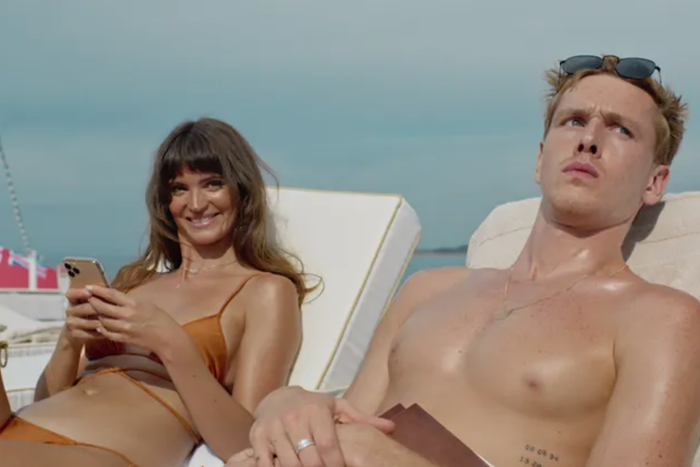
Cannes has an odd relationship with class. People travel all the way to the south of France to sip Champagne, wear tuxedos, and give standing ovations to movies about how insufferable the rich and privileged are. Is it a lingering guilt? Or, in a town where superyachts dot the horizon and there’s always a party you’re not invited to, do even the toniest attendees manage to feel like the have-nots?
That’s the kind of thing that pops into your head during the standing ovation for Ruben Östlund’s Triangle of Sadness, one of the most acclaimed titles playing in competition this year. Östlund is the Swedish auteur behind Force Majeure and Palme d’Or winner The Square, satires that turn their heroes’ lack of self-awareness into comic symphonies. He specializes in men who are constitutionally unable to apologize: In Force Majeure, a middle-aged husband’s refusal to admit he abandoned his family in a moment of fear became a social disease, poisoning the relationships of everyone he encountered; in The Square, a museum director’s ironic distance from everything, including his own actions, led to his downfall.
There is a man who can’t apologize in Triangle of Sadness, too, though here he’s just one player in an entire ensemble of awful. He’s Carl (Harris Dickinson), a male model leeching off his more successful influencer girlfriend (Charlbi Dean); when they go out to dinner, the issue of who pays becomes a Virginia Woolf–style psychodrama. (Credit to Östlund for continuing to paint whole new shades of masculine weakness.) Thanks more to their Instagram followings than any actual capital, the couple winds up on a cruise for the superrich, which is full of the usual suspects: trophy wives, Russian oligarchs, British war profiteers who complain about U.N. land-mine regulations. (More unusual is the ship’s captain, a Marxist played by Woody Harrelson.) It’s The White Lotus on the high seas, at least until the cruise comes to an early end. Then social hierarchies are upended and new currencies gain value. The goal, Östlund told the crowd at the film’s press conference on Sunday, was to depict nothing less than “the end of western civilization.”
Whether he hit those heights is a matter of debate. Greed, condescension, and shallowness are all prime targets for satire, but as the film goes on, it feels like watching a Twitter feed come to life. While Östlund’s eye for comedy is as well tuned as always, it’s hard to avoid the sense here that he is taking the easiest gags. Critics’ reviews have been mixed: Some have called it the best of the fest, while the Guardian’s Peter Bradshaw compared it to using “a howitzer to shoot drugged fish in a barrel.” Audiences are eating it up, though. The eight-minute standing ovation at the premiere was one of the longest so far, and the crowd in my press screening was busting a gut throughout. (I was on hour 27 of no sleep, so I mostly felt like the room was swaying along with the boat.) From an unscientific survey of the non-journalists I’ve crossed paths with, Triangle of Sadness is the only competition title with any sort of “Have you seen this?” buzz.
However, there is one extended set piece that everyone can agree on. Halfway through, the cruise gets caught in a storm, right in the middle of an elegant dinner service. At first, the crew and guests simply brush it off. The service carts start clattering around the dining room, but, still, the meal must go on. Then the vomiting starts. Every color of upchuck, with a frankly impressive level of hydraulic pressure. If that wasn’t bad enough, finally the toilets overflow. Rivers of sewage flood the hallways like a particularly brown remake of The Shining. This movie is 150 minutes long, and I’d reckon at least 30 of them are dedicated to bodily fluids. Cannes has a reputation for being an extremely tough crowd, and maybe that toughness is why viewers are sticking it out. Rather than prompting walkouts, the movie’s going over like gangbusters. Östlund is quite literally rubbing his audiences’ noses in shit, and they love him for it.
Bleak though it may be, as a broad comedy Triangle of Sadness stands out in what has been a comparatively glum competition lineup. One of the accidental themes of this year’s slate has been moral hypocrisy. James Gray’s Armageddon Time, the Romanian dramedy R.M.N., and the Iranian serial-killer thriller Holy Spider are all filled with characters who do bad things while cloaking their actions in the language of moral rectitude. Maybe that’s why Triangle of Sadness is resonating: There is no hiding how terrible all these people are. Their ugliness is going to come out, one end or another.
More From the 2022 Cannes Film Festival
- How to Find Hope and Destroy It
- Charlbi Dean, Star of Palme d’Or Winner Triangle of Sadness, Dead at 32
- Freak Out! Over New Bowie Footage in Moonage Daydream


